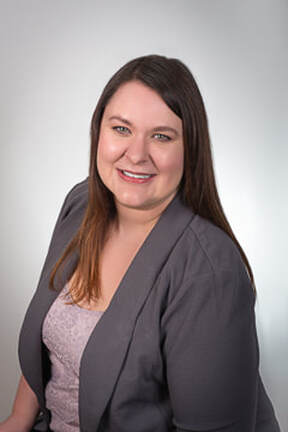|
Masters of Social Work
Licensed Clinical Social Worker To make an appointment with Erin, please call 630-570-0050. You can also email [email protected].
Specializes In:Depression, Trauma, Posttraumatic Stress Disorder (PTSD), Grief and Bereavement, Miscarriage/Early Infant Loss, Infertility, End-of-Life Issues, Caregiver Support, ADHD
Ages Served: Adolescents (12+), Adults, Older Adults |
Professional Experience
I received my bachelor’s degree in psychology from the University of Wisconsin- Platteville, and my master’s in social work from Aurora University. I completed my practicum through KishHealth System, working in a variety of areas from Labor/Delivery to the Cancer Center to Hospice. After earning my degree, I was hired on to work in hospice and home health. I have worked in outpatient mental health, outpatient residential mental health, home health, and hospice. I have provided individual therapy, led support/education groups, and educational seminars to the community.
Specializations and Treatment Approach
I currently treat:
Grief
Miscarriage/early infant loss
Infertility
ADHD
Depression
End-of-life
Caregiver Support
Trauma
I can work with teens (12+), adults, and older adults. Many times people turn to therapy when the ways that they have previously been able to cope to get through difficult situations, or life in general, are just not working anymore. You may have reached a time when striving for those changes are better than continuing on with what is currently occurring. Making change through therapy can be a good place to start. For me, therapy is a safe place where you can come and talk about your stressors and struggles without judgment or pressure.
During therapy with me, your first session will be an opportunity to discuss what areas you would like to focus on and to share some background information about yourself. After the initial session I prefer to let you lead, and we start where you are comfortable. I tailor the types of therapy that we will use in session to your needs and goals. I primarily utilize techniques from Cognitive-Behavioral Therapy (CBT), Dialectical-Behavioral Therapy (DBT), Acceptance and Commitment Therapy (ACT), and the Dual Process Model for Grief in the treatment I provide. I may occasionally assign “homework”, but it is not a cornerstone in my treatment.
When I am working with those who are grieving, I utilize the Dual Process Model for Grief as my guideline alongside grief education. This model is based on the belief that during our grief journey, we bounce back and forth between focusing on our losses and rebuilding our life. In other situations, CBT and DBT are useful for helping us understand the connections between our thoughts and behaviors, then making changes. ACT is helpful in learning to make space for our emotions and accepting them instead of trying to struggle against them.
During my years providing therapy, I have had the opportunity to work with a wide variety of people from different walks of life. My experiences working in a healthcare setting helped to set the stage for working with those who are experiencing chronic/significant health issues, end-of-life, caregiving, and grieving. During that time, I was able to attend Share training and worked with community members to start the first Share Pregnancy & Early Infant Loss support group in DeKalb County. I have attended multiple trainings to help expand my knowledge and understanding of living with ADHD and how to make changes to live successfully.
My goal in therapy is to help those I work with to get the skills and tools they need to live a successful life and to be able to see those that I have worked with grow and flourish.
Grief
Miscarriage/early infant loss
Infertility
ADHD
Depression
End-of-life
Caregiver Support
Trauma
I can work with teens (12+), adults, and older adults. Many times people turn to therapy when the ways that they have previously been able to cope to get through difficult situations, or life in general, are just not working anymore. You may have reached a time when striving for those changes are better than continuing on with what is currently occurring. Making change through therapy can be a good place to start. For me, therapy is a safe place where you can come and talk about your stressors and struggles without judgment or pressure.
During therapy with me, your first session will be an opportunity to discuss what areas you would like to focus on and to share some background information about yourself. After the initial session I prefer to let you lead, and we start where you are comfortable. I tailor the types of therapy that we will use in session to your needs and goals. I primarily utilize techniques from Cognitive-Behavioral Therapy (CBT), Dialectical-Behavioral Therapy (DBT), Acceptance and Commitment Therapy (ACT), and the Dual Process Model for Grief in the treatment I provide. I may occasionally assign “homework”, but it is not a cornerstone in my treatment.
When I am working with those who are grieving, I utilize the Dual Process Model for Grief as my guideline alongside grief education. This model is based on the belief that during our grief journey, we bounce back and forth between focusing on our losses and rebuilding our life. In other situations, CBT and DBT are useful for helping us understand the connections between our thoughts and behaviors, then making changes. ACT is helpful in learning to make space for our emotions and accepting them instead of trying to struggle against them.
During my years providing therapy, I have had the opportunity to work with a wide variety of people from different walks of life. My experiences working in a healthcare setting helped to set the stage for working with those who are experiencing chronic/significant health issues, end-of-life, caregiving, and grieving. During that time, I was able to attend Share training and worked with community members to start the first Share Pregnancy & Early Infant Loss support group in DeKalb County. I have attended multiple trainings to help expand my knowledge and understanding of living with ADHD and how to make changes to live successfully.
My goal in therapy is to help those I work with to get the skills and tools they need to live a successful life and to be able to see those that I have worked with grow and flourish.
About Me
What are your professional and personal values?
I have found that I end up helping many different people determine their personal values when we work together. I believe that knowing your values can help you lead a fulfilling life and understanding the values that others hold can be impactful as well. Some of my personal values (not in any particular order) are family, wisdom/knowledge, honesty, humor, and respect.
Family is something that is very important to me and I recognize how much that can impact each and every person who works with me. I like to understand how family plays a role in everyone’s life. I also encourage people to prioritize their own families. When it comes to wisdom and knowledge, I like to learn and try to approach everyone with curiosity and respect for their own wisdom and knowledge. We will have an opportunity to learn from each other, and I always appreciate that. I am a big believer in transparency and honesty. While boundaries with others are very important, there is a balance between setting boundaries and openness. I tend to use humor during my sessions and have found that it can help people get through even the toughest situations. Respect is vital to me and is a unifying thread throughout the work that I do.
What led you to decide that you wanted to be a therapist?
I have always enjoyed listening to the life stories of others, even when I was quite young. I knew that I wanted to help other people and found that therapy allows me to learn about others and to help them at the same time.
What are some of your favorite self-care activities?
Self-care is something that I engage in regularly. I find listening to music helps to enhance my mood and am also an avid reader. I find that it is important for me to try and carve time every day to do something small, just for myself. On occasion, it is also nice to do something bigger that you enjoy; things like taking time off, traveling, going to a spa, etc.
What is your favorite quote/some of your favorite quotes?
“We can do hard things, but we don’t always have to do them the hardest way possible.” -Jessica McCabe
This first quote is something that I find myself gravitating toward quite a bit. So often we are hard on ourselves for not doing something “the right way”. But who decided that this was “the way” it needed to be accomplished? I would much rather get creative and try to find different solutions to meeting goals and getting things done in life.
“Bloom where you are planted.” -Unknown
Sometimes there is little we can do to change our circumstances, however what we do have control over is how we perceive what is happening. This quote helps me remember to try and make the best of my current experience. Some things we are able to change and some things are out of our control, so it’s up to us to do our best.
I have found that I end up helping many different people determine their personal values when we work together. I believe that knowing your values can help you lead a fulfilling life and understanding the values that others hold can be impactful as well. Some of my personal values (not in any particular order) are family, wisdom/knowledge, honesty, humor, and respect.
Family is something that is very important to me and I recognize how much that can impact each and every person who works with me. I like to understand how family plays a role in everyone’s life. I also encourage people to prioritize their own families. When it comes to wisdom and knowledge, I like to learn and try to approach everyone with curiosity and respect for their own wisdom and knowledge. We will have an opportunity to learn from each other, and I always appreciate that. I am a big believer in transparency and honesty. While boundaries with others are very important, there is a balance between setting boundaries and openness. I tend to use humor during my sessions and have found that it can help people get through even the toughest situations. Respect is vital to me and is a unifying thread throughout the work that I do.
What led you to decide that you wanted to be a therapist?
I have always enjoyed listening to the life stories of others, even when I was quite young. I knew that I wanted to help other people and found that therapy allows me to learn about others and to help them at the same time.
What are some of your favorite self-care activities?
Self-care is something that I engage in regularly. I find listening to music helps to enhance my mood and am also an avid reader. I find that it is important for me to try and carve time every day to do something small, just for myself. On occasion, it is also nice to do something bigger that you enjoy; things like taking time off, traveling, going to a spa, etc.
What is your favorite quote/some of your favorite quotes?
“We can do hard things, but we don’t always have to do them the hardest way possible.” -Jessica McCabe
This first quote is something that I find myself gravitating toward quite a bit. So often we are hard on ourselves for not doing something “the right way”. But who decided that this was “the way” it needed to be accomplished? I would much rather get creative and try to find different solutions to meeting goals and getting things done in life.
“Bloom where you are planted.” -Unknown
Sometimes there is little we can do to change our circumstances, however what we do have control over is how we perceive what is happening. This quote helps me remember to try and make the best of my current experience. Some things we are able to change and some things are out of our control, so it’s up to us to do our best.
Certifications/Trainings
Sharing & Caring: Perinatal Loss Seminar
Dialectical Behavioral Therapy (DBT)
Trauma Informed Care: A Change in Perspective
Grief Summit 2022: Counseling and Treatment Tools for the Changing Face of Grief and Loss
Dialectical Behavioral Therapy (DBT)
Trauma Informed Care: A Change in Perspective
Grief Summit 2022: Counseling and Treatment Tools for the Changing Face of Grief and Loss
Meet Erin! |
Blogs:
|
What is infertility and why do I need to be aware? Infertility is technically the inability to become pregnant after 1 year of unprotected, timed intercourse due to either female or male reproductive issues. However, let’s be a little more inclusive with this definition. It can also apply to those individuals who are able to achieve pregnancy consistently, but are unable to sustain that pregnancy to term. According to a survey by the CDC, 1 in 8 couples have trouble getting pregnant or sustaining that pregnancy. This has become a far more widespread issue than most are aware...(to read more, click on the link above)
|
|
Many grieving people who are facing down the remainder of December find themselves dreading what the holidays are bringing. We have the cultural expectation that the holidays are a time for unfettered joy and celebration, which creates an enormous amount of added stress when you are grieving. When you feel like getting through everyday forces you to put on a mask to hide your grief, the disparity between what you actually feel and the expectations of “joy” and “cheer” that bombard you during the holiday season makes it feel impossible to get through...(to read more, click on the link above).
|
|
The holiday season is one that many people find themselves eagerly awaiting every year; however, not everyone feels that way. For some, the holidays bring feelings of anxiety, sadness, grief, or even a combination of these emotions. When these are the primary emotions you are experiencing, it makes it incredibly difficult to face down all of the upcoming responsibilities and events for the holidays...(to read more, click on the link above).
|
|
When it comes to New Year’s Resolutions, there are so many possibilities for self-improvement that we find ourselves considering. These changes can center around physical or mental health, relationships, work, and so many other options. This is the time of year when so many of us look toward the future and think deeply about the future self we want to become...(to read more, click on the link above).
|
|
Happiness is a word we use almost constantly in our daily language. We are bombarded with advertisements promising that we can pay money to buy this item or go on this trip to be happy. It is something that we have aspired to for so long, and yet what does it mean to be happy? Is it a state of being? Or is it an emotion? What are your thoughts on happiness? How permanent of an experience can it be? (to read more, click on the link above).
|
|
If you are new to the concept of infertility or infertility treatment, this post is for you. Infertility is defined as a disease characterized by the failure to establish a clinical pregnancy after 12 months of regular, unprotected sexual intercourse or due to an impairment of a person’s capacity to reproduce either as an individual or with their partner. Infertility can also refer to a person’s inability to sustain a pregnancy to term. Not all couples have to wait the full year before seeking treatment, as there are other factors that can decrease that timeline. It’s important to understand that infertility is something that is far more common than most people think. 1 in 8 couples have difficulty getting pregnant or sustaining a pregnancy to term...(to read more, click on the link above).
|
|
For so many people who are grieving, getting from November to January every year seems practically impossible. People would oftentimes just rather skip the whole thing and hibernate the season away. The impulse is certainly understandable, since this is a time of year where family and happiness are emphasized everywhere around us. This year, I wanted to share some more information on actual ways to plan for the holidays (including escape plans). These recommendations are just that, only recommendations and may not be right for you or your situation. Every family tradition is different and has a different importance to them...(to read more, click on the link above).
|
|
ADHD stands for attention-deficit/hyperactivity disorder. As an aside, the use of the term ADD has been discontinued. It is now considered part of the broader ADHD term, and you do not have to experience hyperactivity to have ADHD. There are 3 different types of ADHD: hyperactive/impulsive, inattentive, and combined type. When people visualize someone with ADHD, they often picture a child (usually a boy) who cannot sit still in a classroom setting. While this can be one way that ADHD presents, it is not the only way it shows up in children. It can also show up as a child who needs to be reminded four times that they need to get their materials out of their backpack to start their day…every day. The diagnosis has nothing to do with a lack of attention. It is not a character flaw. It is a condition that individuals are born with that results in executive functioning issues (otherwise known as executive dysfunction)...(to read more, click on the link above).
|
|
Have you ever noticed how frequently our responses to the question “how have you been” involve variations of “staying busy”? What about hearing someone talk through a large list of things they currently have going on in their life? For many of us, our reactions involve shock (that one person could manage all of those items) and admiration. We have learned to admire those who don’t seem to have a minute to themselves. This is exactly what is meant by “glorification of busyness”...(to read more, click on the link above).
|
|
Have you ever found yourself feeling overwhelmed by tasks, responsibilities, and expectations? Do you find yourself procrastinating until the last possible minute…even if you had a whole day to get it accomplished? Does the task (when you remember to take care of it) feel like there are just too many steps? This is the tip of the iceberg known as overwhelm, especially in the neurodiverse community. Each person has different tolerances for being overwhelmed and different factors that can contribute. For some, feelings of being overwhelmed may stem from physical stimuli (too loud, too many people, uncomfortable clothes, etc.). For others it may be the sheer amount of steps required and feeling like it will take “forever”...(to read more, click on the link above).
|













